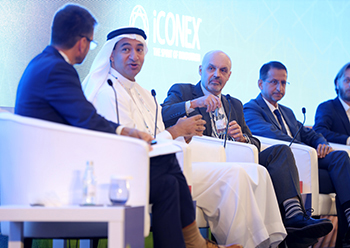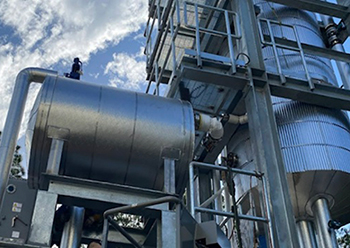

Produced water is highly saline and often viewed as too challenging and too costly to treat for beneficial reuse. Exploration and production companies recycle as much as they can for upstream operations; however, the volume of produced water generated daily far exceeds the volume required for production.
The remaining volumes (more than 15 million barrels a day) is disposed of via permitted salt water disposal wells. With the volume of produced water expected to continue growing by billions of barrels over the coming years, finding an economically viable solution is critical for enabling industry to produce responsibly and sustainably.
To assist its customers in overcoming the challenge with produced water management, Bechtel Engineers developed the patented Low Energy Ejector Desalination System (LEEDS). LEEDS is a thermal desalination process that treats highly saline aqueous streams such as produced water with salinity ranging from 4% to 20%.
Cleaner, more affordable
Using a highly efficient ejector, LEEDS can treat produced water and other high salinity wastewater for reuse at a lower overall cost than other solutions on the market, making it a financially viable option.
LEEDS can be used in a variety of industries to reduce high salinity waste stream volumes and recover as much clean water as possible. The technology treats produced water to a quality suitable for reintroduction into the local ecosystem or for other commercial applications. With the volume of produced water expected to continue to grow over the coming years, finding an economically viable solution is critical for fit-for-purpose use of produced water.
Traditional thermal evaporation processes rely on steam or other heat sources as an input to drive evaporation. LEEDS operates without the requirement for an external heat source. This means it is less expensive to build and operate and can be effectively deployed at facilities that do not have available thermal energy (i.e. steam or other waste heat), providing a lower carbon environmental solution.
LEEDS can transform produced water into four reusable, end-marketable products:
• Distilled water (re-used in "fit-for-purpose" scenarios such as agriculture and grassland irrigation) ;
• Fertilizer (agriculture products);
• 10-pound brine (multiple industrial applications); and
• Calcium carbonate (de-icing and dust suppression)
Bechtel’s commitment to delivering reusable, clean water at an economically viable cost led to the development of its Low Energy Ejector Desalination System (LEEDS) process.
This thermal water treatment process can treat highly saline aqueous streams such as produced water with salinity ranging from 4% to 20%.
Following rigorous literature reviews, computational modeling, bench-scale testing, and a successful pilot unit test, Bechtel’s LEEDS technology is now available on the market, the company said.
With a highly efficient ejector, LEEDS can treat or clean produced water for reuse and resale at a lower overall cost, making it a viable financial option for oil and gas producers.
This patented process delivers four key goals for our customers in the oil production and water midstream markets:
• Reduced costs per barrel of produced water desalination treatment;
• Efficient, environmentally friendly approach to dealing with produced water generated during oil and gas production;
• Reduced volume of produced water that is re-injected into saltwater disposal wells;
• Eliminates existing clean aquifer water demand for fracking.
With a wide variety of common applications, the LEEDS technology can support stand-alone wastewater volume reduction and Zero Liquid Discharge (liquid-free waste) processes.
LEEDS is also applicable to other industries that need to treat highly saline aqueous streams, such as industrial byproduct effluent. It can clean water at a cheaper cost than most other conventional solutions, making it a viable financial option for mining operations, industrial customers, and oil & gas producers.
Bechtel expects to work with its customers and local communities to implement LEEDS as a viable, innovative solution to water scarcity risks for industrial projects.
Meanwhile, Bechtel and Five Point Energy have announced an agreement that enables Five Point to utilise Bechtel’s proprietary LEEDS technology to provide produced water desalination services to customers across the Permian Basin. The agreement establishes an exclusive relationship between Bechtel and Five Point for the marketing, development, and sale of plants utilizing the LEEDS technology for produced water in the Permian Basin.
Deep Blue Holdings, a portfolio company of Five Point, will operate Bechtel’s pilot unit at a saltwater disposal well near Midland, Texas, to support the development of and demonstrate the technology’s reliability.
“Bechtel places a core focus on protecting people and the environment, and we’re proud to help our customers find new and innovative ways to meet their sustainability goals,” said Paul Marsden, president of Bechtel Energy. “LEEDS is part of Bechtel's strategic approach to creating a cleaner world by tackling water scarcity at the source.”
